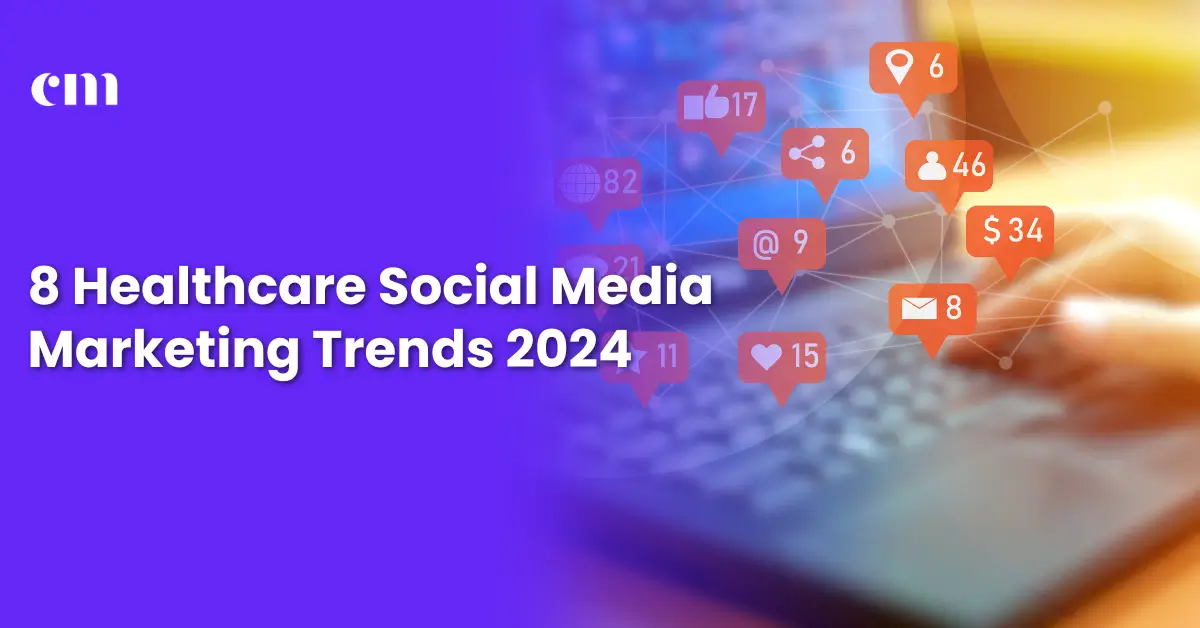Want to grow your social media presence? Here are the top healthcare social media marketing trends in 2024 you must know.
Contents
ToggleSocial media marketing has become an indispensable tool for the healthcare industry, providing a platform to engage with patients to share valuable information, and build a reputable online presence.
According to the Social Media in Healthcare Statistics 2024 report, 84% of patients use social media to seek health information.
As we are already in the middle of 2024, the landscape of social media marketing in healthcare is evolving, with new trends emerging that will shape strategies and practices.
This article delves into the top eight healthcare social media marketing trends to watch in 2024.
Table of Content:
- 8 Healthcare Social Media Marketing Trends 2024
- Emphasis on Video Content
- Increased Use of Influencer Partnerships
- Growth of Telehealth and Virtual Care Promotion
- Focus on Patient Education and Awareness
- Personalized and Targeted Content
- Increased Importance of Community Building
- Embracing New Social Media Platforms and Features
- Regulatory Compliance and Ethical Considerations
- Conclusion
Read More: Why social media marketing is crucial for doctors?
8 Healthcare Social Media Marketing Trends 2024
1. Emphasis on Video Content
Video content continues to dominate social media platforms, and healthcare marketers are increasingly leveraging this medium to connect with their audience.
According to InVideo, video content is 12 times more successful than other types of content.
Short-form videos on platforms like TikTok, Instagram Reels, and YouTube Shorts are particularly effective in conveying health tips, patient testimonials, and educational content.
Benefits of Video Content in Healthcare Marketing
- Engagement: Video content tends to generate higher engagement rates compared to text or image posts.
- Education: Videos can simplify complex medical information, making it more accessible to the general public.
- Trust: Seeing healthcare professionals on video helps build trust and credibility.
Quick Short Tips for Effective Video Marketing
- Create informative tutorials and how-to videos on health-related topics.
- Share behind-the-scenes footage of medical facilities and staff.
- Post patient success stories and testimonials to highlight positive outcomes.
2. Increased Use of Influencer Partnerships
Influencer marketing has proven to be highly effective across various industries, and healthcare is no exception.
63% of healthcare consumers trust health information shared by influencers, according to Social Media in Healthcare Statistics 2024.
Collaborating with health influencers, including medical professionals, wellness coaches, and fitness experts, can amplify your reach and credibility.
Why Influencer Partnerships Work
- Credibility: Influencers often have a loyal following that trusts their recommendations.
- Reach: Partnering with influencers allows healthcare brands to tap into new and engaged audiences.
- Personal Connection: Influencers can convey messages in a more personal and relatable way.
Tips for Successful Influencer Collaborations
- Choose influencers who align with your brand values and target audience.
- Ensure the influencers have a genuine interest in healthcare topics.
- Develop clear guidelines and objectives for the partnership.
3. Growth of Telehealth and Virtual Care Promotion
Cnbctv18 stated that, 44% of consumers turn to YouTube before consulting their doctor or other medical professionals for health information, indicating a preference for online resources.
The rise of telehealth and virtual care has been a significant shift in the healthcare industry, further accelerated by the COVID-19 pandemic.
Promoting these services through social media is essential to inform patients about the availability and benefits of remote consultations.
Promoting Telehealth on Social Media
- Highlight the convenience and accessibility of telehealth services.
- Share patient testimonials and case studies demonstrating successful telehealth experiences.
- Use live sessions and Q&A on platforms like Instagram and Facebook to answer patient queries about virtual care.
4. Focus on Patient Education and Awareness
Patient education is a cornerstone of healthcare marketing, and social media offers an ideal platform to disseminate valuable information.
71% of patients say that positive reviews and social media presence are essential when choosing a healthcare provider.
By focusing on educational content, healthcare providers can empower patients to make informed decisions about their health.
Quick Effective Patient Education Strategies
- Develop infographics and visual aids to explain medical conditions and treatments.
- Share evidence-based articles and research findings.
- Conduct webinars and live streams with medical experts to discuss health topics.
Topics to Cover
- Preventive care and wellness tips.
- Disease management and treatment options.
- Updates on medical advancements and innovations.
5. Personalized and Targeted Content
Personalization in marketing is crucial, and in healthcare, it becomes even more important due to the diverse needs of patients.
Utilizing data and analytics to create personalized content can significantly improve patient engagement and satisfaction.
How to Personalize Healthcare Social Media Content?
- Segment your audience based on demographics, interests, and health conditions.
- Use email marketing and social media ads to deliver tailored messages.
- Create content that addresses the specific concerns and questions of different patient groups.
6. Increased Importance of Community Building
Building a sense of community on social media can help healthcare organizations foster trust and loyalty among patients.
By creating interactive and supportive online environments, healthcare providers can enhance patient engagement.
Ways to Build a Community
- Create and moderate online support groups for patients with similar health conditions.
- Encourage patient interactions through comments, shares, and discussions.
- Host virtual events such as health challenges and group discussions.
7. Embracing New Social Media Platforms and Features
The social media landscape is constantly evolving, with new platforms and features emerging regularly.
Staying updated with these changes and adapting your strategy accordingly can give healthcare marketers a competitive edge.
Emerging Platforms and Features
- Explore the potential of new platforms like Clubhouse for audio-based interactions.
- Utilize interactive features such as polls, quizzes, and augmented reality filters on Instagram and Facebook.
- Experiment with ephemeral content like Instagram Stories and Snapchat to keep your audience engaged.
8. Regulatory Compliance and Ethical Considerations
As healthcare marketers navigate social media, it’s crucial to stay compliant with regulatory guidelines and ethical standards.
This ensures that the information shared is accurate, respectful of patient privacy, and adheres to industry regulations.
Key Considerations for Compliance
- Familiarize yourself with HIPAA and other relevant regulations.
- Obtain consent before sharing patient stories or images.
- Ensure all medical information shared is accurate and evidence-based.
Ethical Marketing Practices
- Avoid sensationalizing medical information or making false claims.
- Be transparent about your affiliations and partnerships.
- Respect patient confidentiality and privacy at all times.
Considerations for Effective Healthcare Social Media Customer Service
Dedicated Team and Response Times:
Establish a dedicated social media customer service team with qualified personnel trained to address patient inquiries and concerns promptly.
Set clear response time expectations and strive to respond to all messages within a designated time frame.
Active Monitoring and Proactive Outreach:
Actively monitor social media channels for mentions of your brand, including comments, messages, and reviews. Implement tools that help you track brand sentiment and identify potential issues before they escalate.
Consider taking a proactive approach by reaching out to patients who have recently interacted with your services to see if they have any questions or concerns.
Personalized and Empathetic Communication:
Treat each patient’s interaction with empathy and respect. Use a personalized approach, addressing patients by name and acknowledging the specifics of their situation.
When responding to negative feedback, avoid defensiveness and focus on finding a solution.
Maintaining Confidentiality:
Be mindful of patient privacy and confidentiality when addressing concerns on social media.
Avoid sharing any personal health information and encourage patients to move to a private messaging platform for more sensitive discussions.
Develop Clear Guidelines:
Establish internal guidelines for handling patient inquiries on social media.
These guidelines should outline response protocols, confidentiality measures, and escalation procedures for complex situations.
Invest in Training:
Provide ongoing training for your social media customer service team.
This training should cover topics such as active listening, de-escalation techniques, and HIPAA regulations.
Utilize Social Listening Tools:
Utilize social listening tools to track brand sentiment, identify trends, and measure the effectiveness of your social media customer service efforts.
By implementing these social media customer service strategies, healthcare organizations can leverage social media to deliver exceptional customer service, build trust with patients, and foster positive brand perception in the digital age.
Conclusion
Social media offers a powerful way for healthcare organizations to connect with patients, build trust, and provide valuable support.
By leveraging video content, engaging with influencers, promoting telehealth, focusing on patient education, personalizing content, building communities, embracing new platforms, and following regulatory guidelines, you can effectively engage your audience in 2024.
These strategies not only enhance patient engagement but also build trust and credibility.
For expert guidance on these latest healthcare social media marketing trends and to elevate your healthcare brand on social media, contact Crawl Math.
We specialize in creating impactful social media marketing strategies that educate, empower, and connect with patients on a deeper level.


